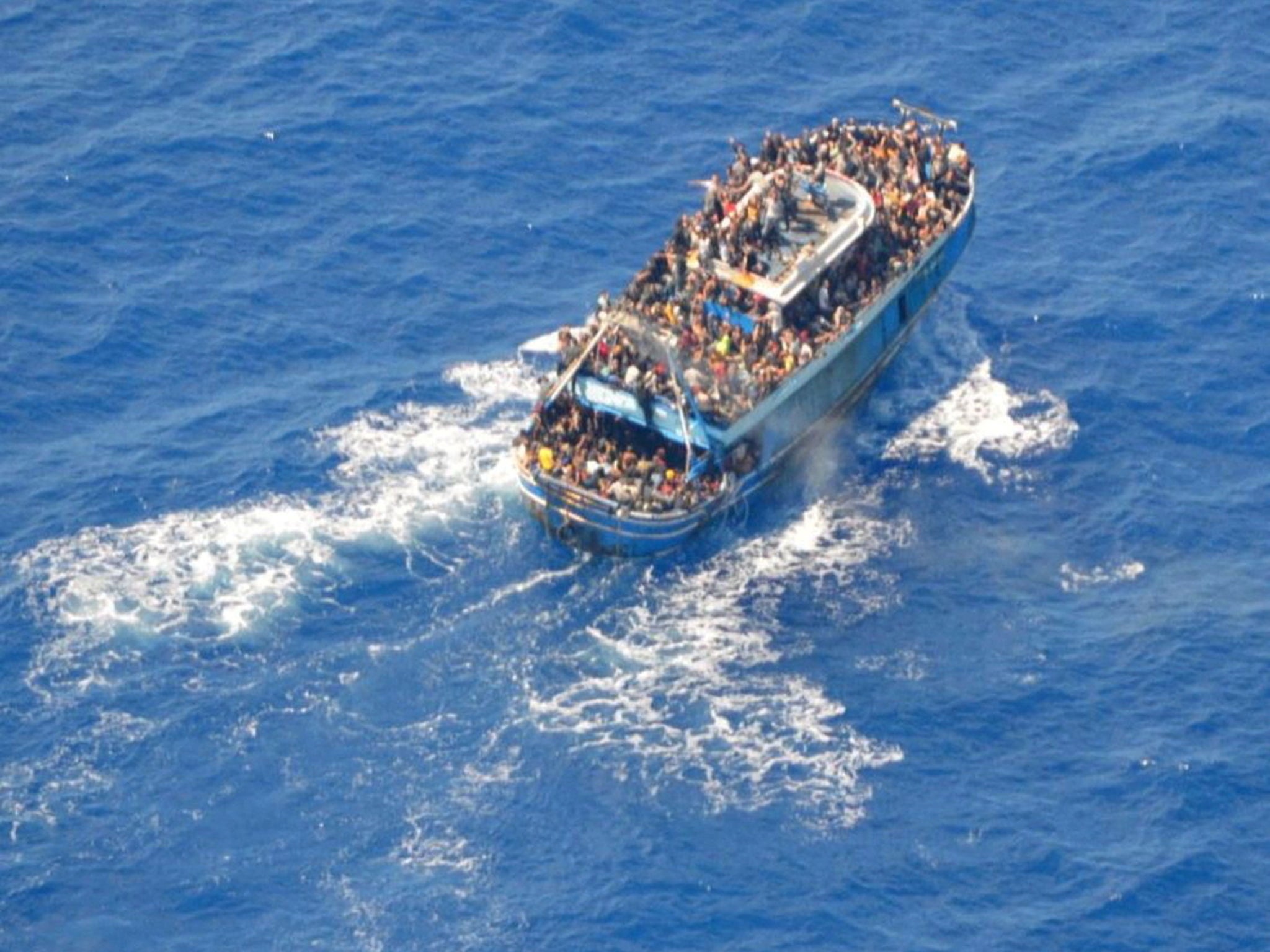Why campaigners say Europe has given up on saving lives in the Mediterranean
Another disaster has raised questions about the EU’s approach to those risking their lives on the deadliest migrant crossing in the world. Katy Fallon reports

In the early hours of 14 June, an overcrowded fishing boat carrying upwards of 700 migrants sank off western Greece. Those on board had paid smugglers thousands of dollars to travel from Libya to Italy – a well-established route often cited as the deadliest migrant crossing in the world.
Of those on board, 104 survived and more than 80 have been confirmed dead; hundreds remain unaccounted for. There were emotional scenes in Kalamata as relatives arrived looking for loved ones who had boarded the doomed boat in search of a better life in Europe.
Greece says it is investigating the circumstances of the shipwreck while survivors wait for their asylum to be processed, but it emerged that a drone from EU border agency Frontex – which receives hundreds of millions of euros from the European Commission each year – flew over and photographed the boat before it sank. Frontex said it notified Greek authorities of the boat and offered further assistance but received no reply.
Although the tragedy stands out as one of the deadliest of its kind, rights groups say it is symptomatic of a push by Europe to deter migrants to such an extent that lives are lost.
Almost exactly a year earlier, 23 migrants were killed trying to cross the border fence between Morocco and the Spanish exclave of Melilla. Media reports suggest authorities used excessive force in the incident, with tear gas and rocks thrown at those trying to cross.
Hanne Beirens, director of Migration Policy Institute Europe, told The Independent the long-held maritime principle of rescue at sea was being undermined through “criminal and administrative sanctions being issued against NGOs operating search and rescue missions in the Mediterranean,” as well as through a lack of political consensus between European nations on migration policies.
“More and more countries are no longer keen on the idea of more migrants arriving and are seeking, first and foremost, to either stop or reduce the number of arrivals on the European continent,” she said.
A group of search and rescuers face criminal charges in Italy in a case going back to 2016, accused of having colluded with people smugglers. Rights groups have pointed to it as an example of an “assault on non-governmental rescue groups that save lives”.
Similarly, a group of NGO workers who worked with asylum seekers arriving on the Greek island of Lesbos face accusations of human smuggling in an ongoing case their lawyers say is replete with errors.
Niamh Keady-Tabbal, a researcher at the Irish Centre for Human Rights, University of Galway, said frontline states such as Greece “are incentivised to ‘stem the flow’ of asylum seekers entering the EU”, adding: “In order to deter migrants, Greece and other EU member states have pursued policies that persecute asylum seekers and those working to uphold their rights, especially those involved in search and rescue.”
She added: “The criminalisation of civil search and rescue in the Mediterranean has made these crossings even more dangerous. Across the EU, the policy in the Mediterranean has been to disengage from any form of proactive search and rescue. The EU’s most recent naval operation in the Mediterranean, Operation Irini, intentionally excludes search and rescue from its mandate.”
Keady-Taball said migrants continue to attempt these dangerous journeys as “they have no alternative routes to travel to Europe to seek protection”. Greece, Croatia and Bulgaria are accused of methods such as pushbacks – refoulement, in official jargon – in which migrants are forcibly removed to another territory without allowing them their right to seek asylum.
Omer Shatz, an international lawyer and the legal director of front-LEX, a campaign group challenging EU migration policies in the courts, says: “Frontex is the principal actor in EU’s deterrence-based policy of mass killings by drowning.”
The 2015 replacement of Italian naval operations – which had rescued at least 150,000 people – by Frontex “marked a substantial withdrawal of EU search and rescue services in the Mediterranean,” he added. “The UN has recently determined that EU policy in the central Mediterranean amounts to crimes against humanity. As front-LEX showed in the EU Court of Justice, Frontex policy in the eastern Mediterranean is even worse: Frontex is not only failing to rescue persons in distress, but is complicit in abducting people from safety on land and abandoning them in distress at sea.”
For its part, Frontex is facing an ever-growing challenge. In 2022, around 330 000 irregular border crossings were detected at EU borders, according to preliminary calculations – the highest number since 2016 and an increase of 64% from 2021.
It says all staff, as well as border guards. “receive training on fundamental rights, access to international protection, including the respect for the principle of non-refoulement, and, where appropriate, search and rescue.”
Meanwhile, there is no let-up in the deadly migrant cycle. In Spain’s Canary Islands, the body of a pregnant woman was found last month in a rubber dinghy that had crossed from nearby northwest Africa, while a few days later more than 30 migrants were feared drowned after their dinghy sank off Gran Canaria.






Join our commenting forum
Join thought-provoking conversations, follow other Independent readers and see their replies
Comments